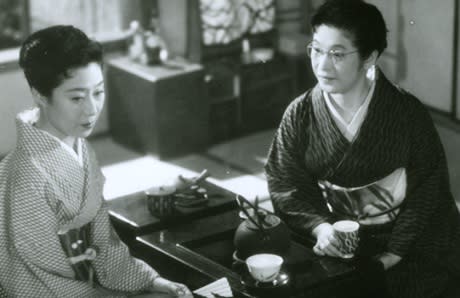Workaholic director Mikio Naruse's obsession with the shifting climate for women in post-war Japan was filtered through the disintegration of traditional cultural values as demonstrated by the waning interest in classically trained geishas in the 1956 film, Flowing.
Like many of his movies, the unobtrusive ensemble piece was based on the writings of a female author; in this case, Aya Kode. Here, the presence of males is even more limited than was typical of his straightforward but emotionally nuanced narratives; the few men who do make brief appearances have only cursory involvement with the plot.
Utilizing some of Japan's strongest actresses of the period, including Hideko Takamine, Kinuyo Tanaka and Isuzu Yamada, Naruse follows the daily lives of the members of a respected geisha house struggling to stay afloat in the face of mounting debt and a populace losing interest in the highly polished skills of the nonsexual fantasy companion as an essential component of a successful social visage.
Prostitution was still legal at the time and many young women desperate for coin posed as human sex doll versions of the genuine article, thus diluting the perception of, and expectation in, authentic purveyors of the craft.
Yamada plays the housemistress, Otsuta, who's trying to maintain the façade of a rich lifestyle by borrowing money from her wealthy sister and former clients. So tied is she to the status of her position as a true artisan that she discourages her daughter, who despises her mother's profession, from applying to menial labour jobs, even though it would mean the very self-sufficiency she herself desires.
Compounding her financial problems and lamentations of the deteriorating standards of the younger generation, her employees lack discipline; though Otsuta herself is more than a little lax when it comes to vital business practices like bookkeeping.
For the dedicated few, though, Tsuta House is a family, with children playing and learning the art of music and dance while everyone pitches in to care for and share in each other's obligations, both professional and personal. As such, there is a fair share of catty competitiveness between the women, but their affection and camaraderie is seldom really in question.
Acting as an external observer and a last bastion of the honourable formality that is otherwise eroding all around them is the new maid of the house, Rika (Tanaka). Her consummate professionalism and humble wisdom quickly gain her the respect and admiration of everyone around her; she is the rock of steadfast tradition around which the steady stream of time flows.
Elegantly capturing the sadness of a time in which those unwilling to adapt faced an exhausting swim against the current of impermanence, Naruse's Flowing is a work of understated beauty, even if it is one that requires a considerable investment of patience to appreciate fully.
Flowing screens at the TIFF Bell Lightbox as part of the Japanese Divas retrospective at 6:30pm on Friday, March 29, 2013.
(Toho Co.)Like many of his movies, the unobtrusive ensemble piece was based on the writings of a female author; in this case, Aya Kode. Here, the presence of males is even more limited than was typical of his straightforward but emotionally nuanced narratives; the few men who do make brief appearances have only cursory involvement with the plot.
Utilizing some of Japan's strongest actresses of the period, including Hideko Takamine, Kinuyo Tanaka and Isuzu Yamada, Naruse follows the daily lives of the members of a respected geisha house struggling to stay afloat in the face of mounting debt and a populace losing interest in the highly polished skills of the nonsexual fantasy companion as an essential component of a successful social visage.
Prostitution was still legal at the time and many young women desperate for coin posed as human sex doll versions of the genuine article, thus diluting the perception of, and expectation in, authentic purveyors of the craft.
Yamada plays the housemistress, Otsuta, who's trying to maintain the façade of a rich lifestyle by borrowing money from her wealthy sister and former clients. So tied is she to the status of her position as a true artisan that she discourages her daughter, who despises her mother's profession, from applying to menial labour jobs, even though it would mean the very self-sufficiency she herself desires.
Compounding her financial problems and lamentations of the deteriorating standards of the younger generation, her employees lack discipline; though Otsuta herself is more than a little lax when it comes to vital business practices like bookkeeping.
For the dedicated few, though, Tsuta House is a family, with children playing and learning the art of music and dance while everyone pitches in to care for and share in each other's obligations, both professional and personal. As such, there is a fair share of catty competitiveness between the women, but their affection and camaraderie is seldom really in question.
Acting as an external observer and a last bastion of the honourable formality that is otherwise eroding all around them is the new maid of the house, Rika (Tanaka). Her consummate professionalism and humble wisdom quickly gain her the respect and admiration of everyone around her; she is the rock of steadfast tradition around which the steady stream of time flows.
Elegantly capturing the sadness of a time in which those unwilling to adapt faced an exhausting swim against the current of impermanence, Naruse's Flowing is a work of understated beauty, even if it is one that requires a considerable investment of patience to appreciate fully.
Flowing screens at the TIFF Bell Lightbox as part of the Japanese Divas retrospective at 6:30pm on Friday, March 29, 2013.
